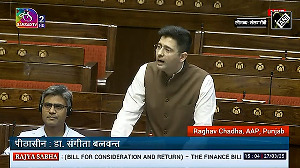In tackling India's unemployment problem, look beyond the finance minister and focus on the education minister points out Gurbachan Singh.

Some unemployment is natural. The natural rate of unemployment among the youth can be higher than the overall natural rate.
But the actual numbers are staggering in India. A little less than one-third of graduates are unemployed, and the unemployment rate for those with secondary or higher education is nearly one in five.
Why this state of affairs, and what can be done about it? Both the supply side and the demand side in the job market are important.
However, the focus here is, unless otherwise specified, on the demand for jobs.
Many young people are looking for jobs, but this is actually just notional demand for jobs, even though the job seekers are serious.
It is only the demand backed by proper skills, education, or some signal for potential contribution in the future that constitutes the effective demand for jobs.
It turns out that such demand for jobs is actually not very high.
The reason is straightforward. A reasonably good quality of education is meaningfully available to only a limited proportion of students.
And, many employers, in various ways, offer jobs to these good candidates. The problem lies elsewhere.
The huge youth unemployment is among those who do have a degree, diploma, or certificate but are not meaningfully educated or skilled.
However, the perception of these students and their families is that they should have a good job.
Unfortunately, this is wishful thinking. This is the harsh reality.
This is not to blame the students or their families and add to their discomfort in any way.
The fault lies in the system of education that has evolved over time in India.
We have a crisis in education notwithstanding the absence of any headlines on this in the media.
The disease lies in the education system.
The huge youth unemployment is a symptom in this context, and it is this that gets media coverage. What is the way out of all this?
We need to restructure education comprehensively, though in a phased manner. While higher public spending on education is important, it is not enough.
We need other steps, such as finding a substitute for the reservation policy in educational institutions.
The role of politics and ideology in education needs to be cut.
It is also about the courses that are typically offered and those that are not offered.
At the same time, the policy of recruitment and promotion of faculty members needs to be seriously reconsidered.
Even the policy of allotment of land for educational institutions needs to be revisited.
We need to go well beyond the Skill India programme as well as the New Education Policy.
The credibility of certification of students does not receive much attention but it is very important.
Many of those who score high grades are actually not very well educated or talented.
Scores based on rote learning, paper leaks, cheating in examination halls, manipulation of results, favouritism, etc are only a part of the problem.
There are other issues. Examinations in India are, by and large, not very discerning.
Since high scores are unreliable as a signal of quality, there is often high unemployment even amongst those who score well in what are otherwise fair examinations.
Also, those who score low are not necessarily incompetent. The scores of some are low due to a flawed examination system.
Another subset of young people is talented, but their potential often lies in areas like stand-up comedy, jewellery designing, creating YouTube videos, etc, for which there is hardly any mainstream credible certification.
So, they are unemployed until they can somehow find their way and, hopefully, not quit.
Some people think that there is hardly any need to educate many students, given the limited job creation on the supply side.
They are missing the larger picture. Jobs are indeed unavailable for those who are not meaningfully trained.
But some form of employment or occupation does show up sooner or later if a candidate is good.
So education is useful, provided the quality is not low and the economic policy is such that we have a meaningfully permissive, enabling, and a well-regulated economy.
This too is important, but it is another story.
Let us finally come to another important part of the story. There is a need to take care of those who have already passed and not found a job.
They need to be re-trained, though differently.
There is also a need for a good unemployment allowance in the interim.
To conclude, the next time you see huge youth unemployment in India, think of not just the finance minister but the education minister as well.
Gurbachan Singh is an economist. He taught at Ashoka University, ISI (Delhi) and JNU.
Feature Presentation: Aslam Hunani/Rediff.com











 © 2025
© 2025